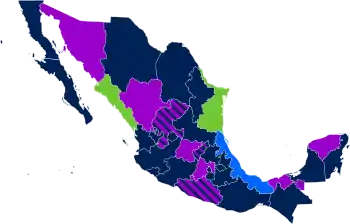Same-sex marriage in Oaxaca
Same-sex marriage is legal in the Mexican state of Oaxaca. A landmark 2012 Supreme Court order for Oaxaca established the right to marriage by amparo (injunction) across the country. In August 2019, the Congress of Oaxaca passed legislation amending various articles of the Civil Code to recognise same-sex marriages.
|
LGBT portal |
|---|
Legal history

Stripes: Proportion of municipal coverage.
2012 Supreme Court case and further legal challenges
In August 2011, three same-sex couples, four women and two men, applied to be married and were denied by the Civil Registry in Oaxaca City.[1] They sought an injunction, but it was denied on 31 January. The couples appealed the judgment to the Collegiate Courts in Civil and Administrative Matters for the State.[1] On 9 April 2012, one of the lesbian couples was granted permission by a judge to marry in Oaxaca, thus becoming the first approval for same-sex marriage in the state. The case was appealed. On 5 December 2012, the three couples won their appeal from the Supreme Court,[1] but local officials refused to perform the marriages. The case returned to the Supreme Court and an additional ruling in favor of the couples was issued. The first lesbian couple received authorization to marry from the Civil Registry on 25 February 2013.[1] They were the first same-sex couple married in Oaxaca and celebrated their marriage on 22 March 2013.[1][2] The male couple received notice of their authorization on 3 June 2013,[1] and the third couple two days later.[3] It was announced in November 2014 that four same-sex couples had married in the state by that time.[1]
On 26 August 2012, a Mexican federal judge ordered the state of Oaxaca to perform same-sex marriages based on the Constitution of Mexico which bans discrimination on the grounds of sexual orientation. This ruling and two others were reviewed by the Mexican Supreme Court, which issued unanimous rulings on 5 December 2012, overturning the ban on same-sex marriage in three individual cases.[4] To establish precedent however, five individual cases must be decided this way.[5]
The 2012 Oaxaca case was pivotal in opening the door to legal same-sex marriage in every state in Mexico through the injunction (amparo) process. Using international decisions, such as the Atala Riffo and Daughters v. Chile case,[6] the U.S. cases Loving v. Virginia and Brown v. Board of Education,[7] and Mexico's own anti-discrimination laws, the Supreme Court ruled on 5 December 2012 that: 1) Laws limiting marriage to one man and one woman, or for the purposes of perpetuating the species, violate federal law requiring that they "correspond to all persons without any distinction" and 2) That such laws are unconstitutional on the basis of discrimination by sexual orientation and usurpation of the right, not only of the individual but also the couple's right, to form a family.[8] Barring legislative will to change state laws, a provision in the Mexican Code allows that five rulings in a state with the same outcome on the same issue override a statute and establish the legal jurisprudence to overturn it.[9] Thus, marriages obtained by injunction can be performed in any state, regardless of whether the state Civil Code has been changed.[10]
On April 23, 2014, the Mexican Supreme Court granted 39 same-sex couples the right to marry.[11] A same-sex couple from San Juan Bautista Tuxtepec won an injunction in court in early July 2016.[12]
In July 2017, a same-sex couple from Oaxaca City was successful in getting married without receiving an injunction.[13] The first same-sex marriage in Santiago Jamiltepec took place in April 2018.[14] Salina Cruz's first same-sex marriage was performed the following month.[15] Both couples married after filing for an injunction in court.
Administrative process
On 26 August 2018, the Oaxaca Civil Registry began allowing same-sex couples to marry without the need for an injunction. However, the process took three business days, compared with two hours for opposite-sex couples.[16][17][18][19] Lawyer Daniel Merlin Tolentino explained that the difference of waiting time between heterosexual and same-sex couples was to ensure the marriage would comply with jurisprudence. The Civil Registry would carefully consider and analyse each marriage request from a same-sex couples to ensure its legitmacy, as state law at the time still banned same-sex marriages. The couple must present valid documents, including a marriage request, both spouses' birth certificates and official documents and the results of a premarital medical test, as well as have at least 4 witnesses present. The cost is identical to heterosexual couples.
Legislative action
On 28 August 2019, the Congress of Oaxaca passed a bill in a 25–10 vote to make the definition of marriage and concubinage in the Civil Code gender-neutral.[20][21][22] It was signed into law by Governor Alejandro Murat Hinojosa on 29 August, published in the official state journal on 5 October 2019 and came into effect that same day.[23] Article 143 of the Civil Code was changed to read:
- in Spanish: El matrimonio es un contrato civil celebrado entre dos personas, que se unen para realizar una vida en común y proporcionarse respeto, igualdad y ayuda mutua.
- (Marriage is a civil contract between two people, who unite to establish a life together and to provide each other with respect, equality and mutual assistance.)
| Political party | Members | Yes | No | Abstain | Absent |
|---|---|---|---|---|---|
| 26 | 17 | 3 | 4 | 2 | |
| 6 | 4 | 2 | |||
| 3 | 3 | ||||
| 2 | 2 | ||||
| 2 | 1 | 1 | |||
| 2 | 2 | ||||
| 1 | 1 | ||||
| Total | 42 | 25 | 10 | 4 | 3 |
Public opinion
A 2017 opinion poll conducted by Gabinete de Comunicación Estratégica found that 43% of Oaxaca residents supported same-sex marriage. 55% were opposed.[24]
According to a 2018 survey by the National Institute of Statistics and Geography, 52% of the Oaxaca public opposed same-sex marriage.[25]
A 2020 survey conducted by the Center for Social Studies and Public Opinion (CESOP) on 1,400 respondents showed that 62% of Oaxacans were opposed to same-sex marriage, while 37% supported and the remaining 1% were undecided. Levels of support varied greatly with age; it was highest among 18–24-year-olds at 61% and 25–34-year-olds at 50%, while among those aged 55 and above 78% were opposed. Attitudes also varied among district; with support highest in the 8th electoral district (which includes the state capital, Oaxaca City) at 59%, followed by the 6th electoral district (located in the western part of the state, containing municipalities from the Mixteca and Sierra Sur regions) at 58%. Opposition reached 90% in the 5th and 7th electoral districts in the eastern part of the state (containing the entirety of the Istmo Region). Women were also more likely to support same-sex marriage than men.[26]
References
- Matrimonio entre personas del mismo sexo. Caso Oaxaca
- "Oaxaca celebra su primera boda gay tras fallo de SCJN", Terra, 28 March 2013
- Suprema Corte avala segundo matrimonio gay en Oaxaca
- "Mexico Supreme Court Rules In Favor Of Marriage Equality". ThinkProgress. 5 December 2012. Retrieved 5 April 2014.
- "Mexican supreme court decision first step in possible path to national gay marriage". Washington Post. 7 December 2012. Retrieved 8 December 2012.
- Mexican Supreme Court rules for marriage equality
- Mexican Supreme Court: American Cases Demand Marriage Equality
- (in Spanish) DECRETO NÚMERO 345 POR EL QUE SE APROBÓ EL CÓDIGO CIVIL PARA EL ESTADO DE OAXACA, ARTÍCULO 143. DETERMINAR LA INTERPRETACIÓN DE LOS ARTÍCULOS 1 Y 4 EN CONJUNCIÓN CON EL ARTÍCULO 121, 124 Y 133, CONSTITUCIONALES TODOS LOS ÁMBITOS DE PODER POLÍTICO ESTÁN OBLIGADOS NO SÓLO A NO DISCRIMINAR A LAS PERSONAS POR SU ORIENTACIÓN SEXUAL E IDENTIDAD DE GÉNERO, SINO A PROTEGER LA EXPRESIÓN DE SU IDENTIDAD LO QUE IMPLICAN PROTECCIONES LABORALES, EDUCATIVAS, DE SALUD, PROTEGER SUS RELACIONES FAMILIARES, PROHIBIR LA DISCRIMINACIÓN A NIÑOS LGBTI O MIEMBROS DE FAMILIAS DIVERSAS Y MUCHAS OTRAS MÁS.
- Mexican Supreme Court finds gay marriage ban unconstitutional
- (in Spanish) Legal el matrimonios de personas del mismo sexo
- "La SCJN declara inconstitucional prohibición del matrimonio gay en Oaxaca" (in Spanish). CNN México. 24 April 2014. Retrieved 26 April 2014.
- "Pareja gay gana amparo y podrá casarse en Tuxtepec". Panorama del Pacifico. 7 July 2016.
- Realizan en Oaxaca primera boda gay sin juicio de amparo
- (in Spanish) Celebran matrimonio gay en Santiago Jamiltepec, Oaxaca
- (in Spanish) Realizan primera boda legal entre mujeres en Salina Cruz
- (in Spanish) Van 6 matrimonios igualitarios en Oaxaca durante 2018
- (in Spanish) Por primera vez, en Oaxaca permitirán celebración de matrimonios gay
- Redacción (27 August 2018). "Avala Oaxaca matrimonio igualitario sin amparo". ORO :: Organización Radiofónica de Oaxaca (in Spanish). Retrieved 26 May 2019.
- "Por primera vez, en Oaxaca permitirán celebración de matrimonios gay". lasillarota.com (in Spanish). Retrieved 26 May 2019.
- Oaxaca aprueba el matrimonio igualitario
- Congreso de Oaxaca aprueba el matrimonio igualitario
- Oaxaca Congress approves same-sex marriage by 25-10
- "Decreto por el que se adiciona el tercer párrafo al artículo 39, el párrafo segundo del artículo136; la fracción III al artículo 137, 137 Bis, 137 Ter, 137 Quáter; se reforma el primer párrafo al artículo 143, el primer párrafo del artículo 143 Bis, primera fracción del artículo143 Quáter, segundo párrafo del artículo 166, los artículos 171, 176, 212, 214, 228, 229,501, 744 y 1538; todos del Código Civil para el Estado de Oaxaca" (PDF). congresooaxaca.gob.mx (in Spanish).
- (in Spanish) Encuesta nacional 2017, Gabinete de Comunicación Estratégica
- (in Spanish) #Data | ¿Quién está en contra del matrimonio gay?
- "Reprueba matrimonio igualitario 62.2% de oaxaqueños; personas de más de 55 años, los que más se oponen". El Universal (in Spanish). 29 March 2020.
